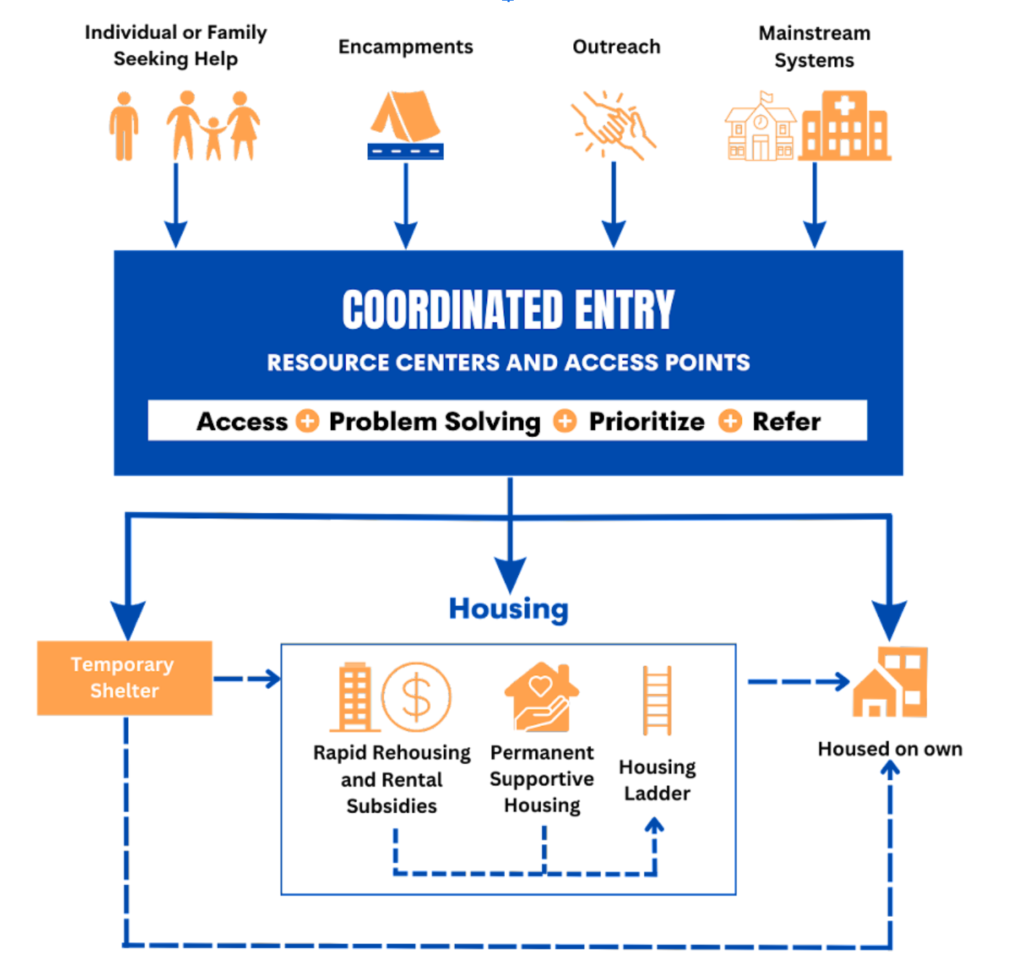The Coordinated Entry System
- The Coordinated Entry System (CES)
- Core Components
- No Wrong Door Approach
- CES Assessment
- CES Training
- CES Policies & Forms
What is the Coordinated Entry System?
The Coordinated Entry System (CES) is a collaborative community response to anyone experiencing homelessness. It provides streamlined and equitable access to housing interventions for people experiencing homelessness in Memphis/Shelby County.

Regardless of where someone first seeks services, access is based on vulnerability, eligibility, and choice. The Memphis/Shelby County Coordinated Entry System has been developed to achieve this goal and to align with the U.S. Department of Housing and Urban Development (HUD) requirements. HUD guidelines address key components of Coordinated Entry, including how people access the system, the standardized assessment tools used, and how people are prioritized for different types of housing interventions.
The Coordinated Entry (CES) System uses a Housing First approach and has four process components: access, problem solving, prioritization, and referral. CES is a fully integrated crisis response system that prioritizes housing and supportive services for the most vulnerable people first, so nobody is left without necessary help.
Coordinated Entry is a systematic response to anyone experiencing homelessness within Memphis and Shelby County. Our Coordinated Entry System was created to identify, assist, house, and prevent homelessness in a swift and efficient manner.
Housing First
**COMING SOON**
CES Core Components
HUD requires four core components for all Coordinated Entry Systems. Access serves as the initial point of engagement for those facing housing crises. Following access, then an assessment is administered, where CoC providers evaluate housing needs, preferences, and vulnerability progressively. Prioritization is then determined, ensuring those with the highest need receive priority access to community resources. Finally, Matchmaking connects individuals to available CoC housing resources based on established prioritization guidelines.
No Wrong Door (NWD) Approach
This approach allows for those persons to access the CES and be assessed for housing eligibility regardless of which agency they initially connect with. This DOES NOT mean an agency who enters persons into CES, who cannot provide services is obligated to do so.
Persons experiencing homelessness can be entered into the CES at any of the below agencies that have CES assessors. The below CES assessors are community service providers for a variety of populations. Below are CES assessors in the community in alphabetical order, please note the population the agency primarily provides services to.
Below are all the “DOORS” in the No Wrong Door Approach
| Catholic Charities of West TN (CCWTN) Individuals, Youth & Veterans 1325 Jefferson Ave, Memphis, TN 38104 901-722-4762 | Hospitality HUB Individuals 590 Washington Ave, Memphis, TN 38105 (901) 730-1736 |
| Case Management Inc (CMI) Individuals 3171 Directors Row, Memphis, TN 38131 (901)821-5600 | MIFA Families 910 Vance Ave, Memphis, TN 38126 (901) 527-0208 Hotline for Homeless Families: (901) 529-4545 |
| Friends for All (FFA) Individuals 1548 Poplar Ave, Memphis, TN 38104 (901) 272-0855 | OUTMemphis LGBTQ youth 892 Cooper St, Memphis, TN 38104 (901) 278-6422 |
Coming soon!
